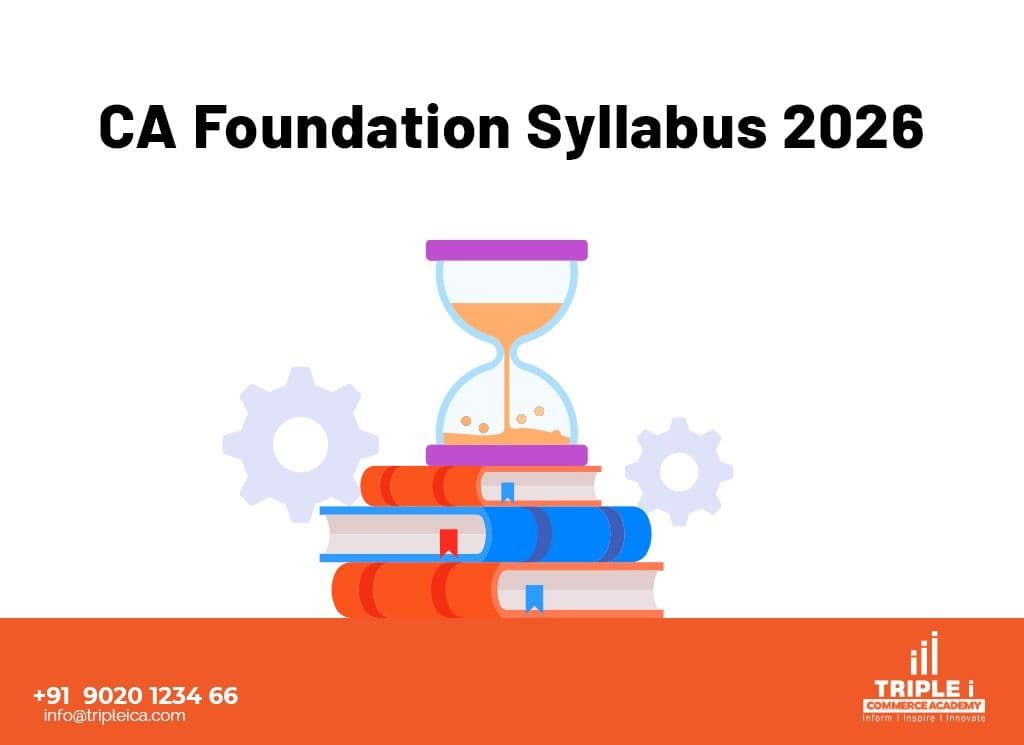CA Foundation Syllabus 2026 – Subjects, Exam Pattern & Marks
Published on: October 22, 2025

Table of Contents
The ICAI has released the CA Foundation 2026 syllabus, which is applicable for the Jan/May/Sept 2026 exams.
The CA Foundation Syllabus 2026 is divided into four subjects. The CA Foundation paper pattern consists of four papers, each conducted by the ICAI, totaling 100 marks. The CA Foundation Paper pattern consists of both objective and subjective types.
Appearing students have to score 40% marks in each subject along with a 50% aggregate score to qualify for the CA Inter exam.
CA Foundation Subject Overview
CA FOUNDATION EXAM
The CA foundation exam includes four papers: Paper 1: Principles & Practice of Accounting, Paper 2: Business Laws and Business Correspondence and Reporting, Paper 3: Business Mathematics, Logical Reasoning and Statistics, Paper 4: Business Economics and Business and Commercial Knowledge.
Paper 1 & 2 will be of 3 hours, and Paper 3 & 4 will be of 2 hours.
Marking Scheme:
- For Subjective (Papers 1 and 2) – No Negative Marking
- For Objective papers (papers 3 and 4), a 0.25/1/4 mark will be deducted for every wrong answer
CA Foundation Syllabus 2026
Paper 1: Principles and Practices of Accounting Syllabus (100 Marks)
Principles and Practices of Accounting is the first paper of the CA Foundation course. The syllabus of CA Foundation Accounts consists of basic accounting, which students might have studied in the 11th and 12th.
The CA Foundation Accounts syllabus for the Jan 2026 exams is as follows:
Module 1:
- Theoretical Framework
- Meaning and Scope of Accounting.
- Accounting Concepts, Principles, and Conventions.
- Capital and Revenue Expenditure and Receipts
- Contingent Assets and Contingent Liabilities.
- Accounting Policies
- Accounting as a Measurement Discipline – Valuation, Principles, Accounting Estimates
- Accounting Standards
- Accounting Process
- Basic Accounting Procedure – Journal Entries
- Ledgers
- Trail Balance
- Subsidiary Books
- Cash Book
- Rectification of Error
- Bank Reconciliation Statements
- Inventories
- Depreciation and Amortisation
- Bills of Exchange and Promissory Notes
- Preparation of Final Accounts of Sole Proprietors
- Final Accounts of Non-Manufacturing Entities
- Final Accounts of Manufacturing Entities
Module 2:
- Financial Statements of Not-for-profit Organisations
- Accounts from Incomplete Records
- Partnership and LLP Accounts
- Introduction to Partnership Accounts
- Treatment of Goodwill in Partnership Accounts
- Admission of a New Partner
- Retirement of a Partner
- Death of a Partner
- Dissolution of Partnership Firms and LLPs
- Company Accounts
- Introduction to Company Accounts
- The issue, Forfeiture, and Re-Issue of Shares
- Issue of Debentures
- Accounting for Bonus Issue and Right Issue
- Redemption of Preference Shares
- Redemption of Debentures
Paper 2: Business Laws
The CA Foundation Law syllabus consists of theory and needs proper understanding.
Module 1:
- Indian Regulatory Framework
- The Indian Contract Act, 1872
- Nature of Contracts
- Consideration
- Other Essential Elements of a Contract
- Performance of Contract
- Breach of Contract and Its Remedies
- Contingent and Quasi Contracts
- Contract of Indemnity and Guarantee
- Bailment and Pledge
- Agency
- The Sale of Goods Act, 1930
- Formation of the Contract of Sale
- Conditions & Warranties
- Transfer of Ownership and Delivery of Goods
- Unpaid Seller
- The Indian Partnership Act, 1932
- General Nature of Partnership
- Relations of Partners
- Registration and Dissolution of a Firm
- The Limited Liability Partnership Act, 2008
- The Companies Act, 2013
- The Negotiable Instruments Act, 1881
Paper 3: Quantitative Aptitude
Quantitative Aptitude is the third paper of the CA Foundation. It helps students develop an understanding of basic maths, reasoning, and statistics.
Part A: Business Mathematics Syllabus
- Ratio and Proportion, Indices and Logarithms
- Equations
- Linear Inequalities with Objective Functions and Optimization w.r.t. objective function.
- Mathematics of Finance
- Basic Concepts of Permutations and Combinations
- Sequence and Series – Arithmetic and Geometric Progressions
- Sets, Relations, and Functions, Basics of Limits and Continuity functions
- Basic Applications of Differential and Integral Calculus in Business and Economics
Part B: Logical Reasoning Syllabus
- Number Series, Coding and Decoding, and Odd Man Out
- Direction Tests
- Seating Arrangements
- Blood Relations
Part C: Statistics
- Statistical Representation of Data
- Sampling
- Measures of Central Tendency and Dispersion
- Probability
- Theoretical Distributions
- Correlation and Regression
- Index Numbers
Paper 4: Business Economics
Business Economics is the fourth and last subject of the CA Foundation.
Module 1: Business Economics Syllabus
- Nature & Scope of Business Economics
- Introduction
- Basic Problems of an Economy & Role of Price Mechanism
- Theory of Demand and Supply
- Law of Demand and Elasticity of Demand
- Theory of Consumer Behavior
- Supply
- Theory of Production and Cost
- Theory of Production
- Theory of Cost
- Price Determination in Different Markets
- Meaning and Types of Markets
- Determination of Prices
- Price Output Determination under Different Market Forms
- Business Cycles
- Determination of National Income
- National Income Accounting
- The Keynesian Theory of Determination of National Income
- Public Finance
- Fiscal Functions: An Overview, Centre and State Finance
- Market Failure/ Government intervention to correct Market Failure
- The Process of Budget Making: Sources of Revenue, Expenditure Management, and Management of Public Debt
- Fiscal Policy
- Money Market
- The Concept of Money Demand: Important Theories
- The Concept of Money Supply
- Monetary Policy
- International Trade
- Theories of International Trade
- The Instruments of Trade Policy
- Trade Negotiations
- Exchange Rate and Its Economic Effects
- International Capital Movements
- Indian Economy
